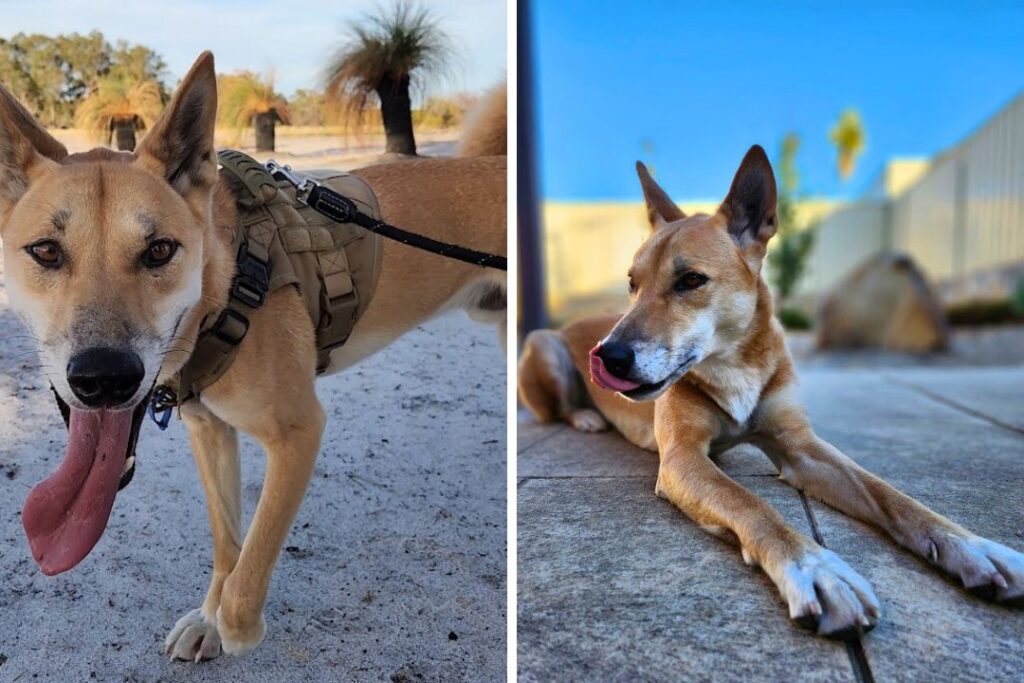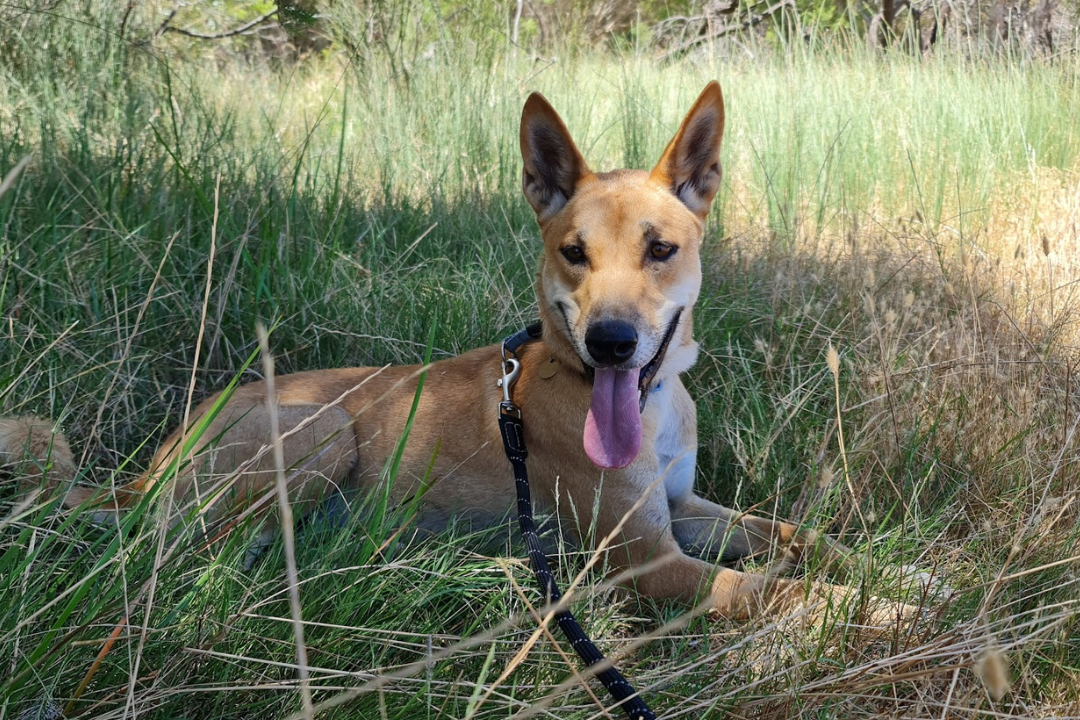Thinking of adopting a dingo?
If you’re thinking of bringing a dingo into your family, there are a few important things to consider when making the decision, which I’ll touch on briefly below. I’ll also list a few organisations you can contact if you’re thinking of adopting a dingo.
What to consider when adopting a dingo
There is so much to consider if you’re adopting a dingo in Australia. These are the things I looked into before we adopted our dingoes and I hope it can be of help to you.
Is it legal to adopt or buy a dingo in your state or territory?
Unfortunately adopting a dingo is not possible in all states in Australia. Please check the relevant legislation in your state or territory for the latest information. Here is a summary that was up to date as of January 2024:
- New South Wales – It is legal to adopt or buy a dingo.
- Victoria – It is legal to adopt or buy a dingo but you must obtain a licence, which has specific requirements.
- Queensland – It is not legal to adopt or buy a dingo as a pet.
- Australian Capital Territory – It may be legal to adopt a dingo, I was unable to confirm this.
- Tasmania – It is illegal to adopt or buy a dingo in Tasmania.
- South Australia – it is illegal to have a dingo as a pet inside the “Dog Fence” (Dog Fence), unless you have a permit. Permits are highly restricted.
- Western Australia – It is legal to adopt or buy a dingo. The only requirements are the same that apply to domestic dogs e.g. microchipping, registration.
- Northern Territory – It is legal to adopt or buy a dingo but you must have a permit.
- There are a few exceptions, such as dogs which are a dingo cross, but you wouldn’t be able to register them as a dingo in certain states.

Do you have secure fencing suitable for a dingo?
Dingoes are more flexible than dogs — this means they can escape easily through narrow crevices and escape from many types of collars and harnesses. They also have flexible paws enabling them to undo latches and open doors. Dingoes can jump and climb with ease, so high fencing is a must. Dingoes also love to dig which means you’ll need to ensure the base of your fencing is secure, either extended into the ground or via a horizontal barrier such as mesh. Your dingo adoption agency will specify the fencing requirements for your specific dingo. Victoria has strict fencing requirements, which you can find here.
Do you have children in your home?
Dingoes are not always suitable if you have children. Dingoes sleep nearly all day, but when they’re active, they’re boisterous, fast and strong. This means they can easily knock over small children, or anyone, to be honest! Children and their compatibility with dingoes are an important consideration and you can read more about kids and dingoes here. This is a must-read if you have children in your home.
Do you have small pets in your home?
Dingoes are apex predators. If you have small pets in your home, such as guinea pigs or rabbits, or if you keep chickens, dingoes might not be a good fit.
Are you able to provide your dingo with enough exercise?
Ideally, you’ll need to walk your dingo once a day. The amount of walking will vary, depending on your dingo and your lifestyle. Some people walk their dingoes twice a day but for many of us, that’s not feasible. Here’s an example of how to exercise your dingo.
Do you want a cuddly lap dog?
Dingoes are aloof. There may be exceptions, but generally, dingoes are aloof — they like their space, they are not lap dogs and take a while to warm up to strangers. Quite a few dingo guardians allow their dingoes to sleep in the same bed as them. In our home, our dingoes sleep indoors, but are now allowed in bedrooms… They love their bed (it’s a bunk!). Although our dingoes are affectionate with us to an extent, they appreciate having space when they sleep and they like to be affectionate on their terms.
Are you able to provide your dingo with a raw, high protein diet?
Dingoes need a high protein diet. Dingoes cannot process fats and carbohydrates like other canines. If you’re adopting a dingo, it’s a good idea to check how much you might be spending on their high protein diet. We mostly feed our dingoes raw kangaroo, emu, chicken, eggs and sardines. There are many other proteins they can eat but dingoes are not animals that can survive and thrive on kibble, canned dog food or rolls of dog food which often contain many carbohydrates and fats. Your local pet food supplier will have raw kangaroo and chicken available.

Should you buy or adopt a pet dingo?
Most dingo guardians in Australia would advise against buying a dingo, for a few reasons:
- There are many, many dingoes who are in need of adoption. For this reason, breeding dingoes for the purpose of selling them as pets is seen as irresponsible. It’s argued that dingoes should only be bred in specific dingo sanctuaries and even then, the sanctuaries ensure dingoes are going to zoos or animal sanctuaries, not domestic homes. Many dingoes are displaced every year from their homes due to inhumane treatment, including the use of steel jawed traps, 1080 poison and shooting.
- Those who sell dingoes might not screen potential buyers carefully, which means that dingoes often end up being surrendered as the owners were not prepared for the realities of adopting a dingo. Rehoming dingoes is extremely difficult.
- Dingo breeding is not closely regulated, so you won’t know if you are buying a pure dingo. In some states or territories it is illegal to breed dingoes with other dingoes or dogs — you’ll need to check your local laws.
Adopt, don’t shop.

What should I look for when I adopt a dingo?
Before adopting a dingo, it’s important to look into who you are adopting from. Look for a trustworthy organisation which has an understanding of dingoes and their needs and who has not obtained their dingo illegally or unethically.
Information to check:
- Do they understand that dingoes are different to dogs?
- Do they have a screening process for people wanting to adopt a dingo? This is essential for the long term wellbeing of dingoes and dingo guardians — otherwise there is a greater risk of the dingo being dumped or surrendered.
- Are they charging a reasonable adoption fee or are they seeking to make a profit? Adoption fees usually cover basic expenses like vaccinations and can range from $0 to about $600.
- Where did the dingo come from and under what circumstances? Can you verify this information?
- Are they a registered charity? Registered charities in Australia are not-for-profit and must comply with specific standards. You can check at Australian Charities and Not-for-profits Commission. Dingo rescues do not have to be registered as a charity but if they are registered, it’s a good sign.
How will you know if you’re adopting a pure dingo?
Dingoes come in a variety of colours but they also have distinct physical characteristics, such as white paws. Some dingoes look very “dingo”, while others look less like a typical dingo.
Individuals who are very familiar with dingoes will be able to give you advice in the short term, and in the long term it is possible to seek DNA testing through dog DNA testing organisations, but I recommend Dr Kylie Cairns who is conducting research into dingo genetics in Australia.
Here are some useful links:
- Dingo physical characteristics Facts – Dingo Den Animal Rescue
- Dingo colours All the colours of the dingo: not just a yellow dog | UNSW Newsroom
- Dr Kylie Cairns – University of NSW. Dr Cairns can also be found on Facebook at Dingo Genetics.

Where to adopt a dingo in Australia
Please note I have only listed the organisations which are registered as a charity with Australian Charities and Not-for-profits Commission (ACNC). Interstate adoptions are possible, such as adopting a dingo from NSW if you live in Victoria.
Adopt a dingo in New South Wales
Adopt a dingo in Western Australia
Learn more about Sydney Dingo Rescue and why dingoes need adoption:
Want to support dingoes without adopting?
Australian dingoes need your support. If you’re not able to adopt a dingo, consider donating to a dingo sanctuary or volunteering your skills and time. You can donate to the organisations above or to dingo sanctuaries below. The sanctuaries below do not offer dingo adoptions and are registered with the Australian Charities and Not-for-profits Commission:
- Australian Dingo Foundation (Victoria)
- Durong Dingo Sanctuary (Queensland)
- Dingo Sanctuary Bargo (NSW)
- Adopt a Dingo | Dingo Sanctuary – Perth | Kaarakin (Western Australia)
- Jirrahlinga Dingo Conservation and Wildlife Education Centre (Victoria)
Further reading about dingoes
Dingoes are not dogs
Although dingoes are canines and share many characteristics with domestic dogs, the Australian dingo is not a dog. You can find more information about this difference here:
- The dingo is a true-blue, native Australian species, The Conversation, Written by Dr Bradley Smith, Dr Corey Bradshaw, Dr Euan Ritchie, Dr Justin W. Adams, Dr Kylie Cairns, Dr Matthew Crowther
- Dingo genome suggests Australian icon not descended from domestic dogs | New Scientist Featuring Dr Bill Ballard
- New DNA testing shatters ‘wild dog’ myth: most dingoes are pure, The Conversation, Written by Dr Kylie Cairns, Dr Matthew rowther, Mike Letnic
- Scientists find dingoes genetically different from domestic dogs after decoding genome, The Guardian

I have been wanting to adopt a dingo for decades! how do I adopt a dingo to the us.
Hi Elizabeth! Australian dingoes aren’t allowed to leave the country but in the USA you can adopt a Carolina dog (American dingo). They are genetically different to Australian dingoes but share some characteristics such as being aloof and wary of strangers.